HUGH WALTERS - WALTER HUGHESScience Fiction Writer |
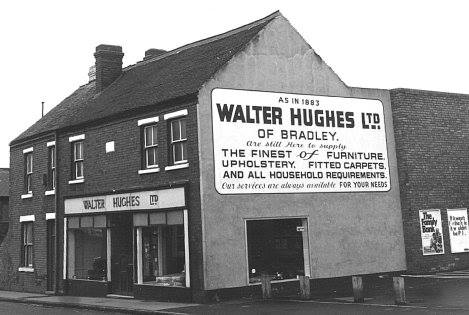 |
Walter Llewellyn Hughes was born on 15th June 1910 in his
family home which was above his father's furniture shop in Bradley. He
attended Dudley Grammar School and then went to Wolverhampton College. Walter Hughes's furniture
shop was in Caledonia House, the building on the right. It
was later an ironmonger's, Lee Brothers. When he started work it may, at first, have been in his father's business. But in due course he ran his own furniture store, Walter Hughes Ltd. in Bradley. He also became the Managing Director of Bradsteds Ltd, (Bradsteds was a contraction of Bradley Bedsteads) who made iron framed bedsteads.In 1931 he married Doris Higgins. They had two children, Walter (who went into the RAF) and Gillian (who became a nurse). They lived in The Bungalow, Elm Avenue, Bilston. |
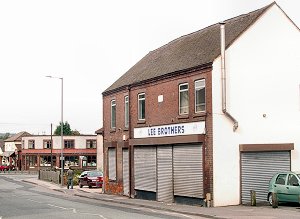 | Far left the shop in it's prime. Left as it is now Lee Brothers. |
Walter was a member of the Rotary and of the Ancient Order of Foresters, of which association he eventually High Chief Ranger. He was an active member of the Bilston Tennis Club. He was interested in local politics and was elected to the Bilston Borough Council. In due course he was appointed a magistrate.
It seems that Walter had always had literary inclinations. He published a poem in his school magazine, "The Dudlean", and wrote numerous short stories, most of which he threw away and none of which was published. His writing career did not start until he was 47. In 1955, when the scheduled speaker failed to appear at the Bilston Rotary, he gave a talk about space and astronomy. This was reported in the local press and the report was picked up by the Librarian at Coseley, who asked him to talk about science fiction at a book week. It seems that at this point he had had an engineering training and a personal interest in space and space exploration, but he knew little or nothing about science fiction. So to prepare for his talk he read a large number of science fiction books. He was not impressed. He decided he could do better. He therefore tried it, writing secretly at his office. His first effort was entitled "Blast Off at Woomera" and was accepted by the first publisher he sent it to. This was the start of a series of about 24 books.
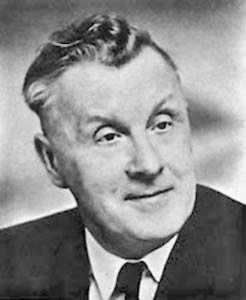 |
His first book was written under the pseudonym High Walters. He later
said: "As I was also a magistrate and a local councillor I felt
[that writing science fiction] left me open to ridicule. People tend to
treat science fiction as a bit of a joke, so I juggled with name and
wrote under the pseudonym of Hugh Walters."
The first book was well received and when he came to publish another, and then more and more, he was stuck with the name. But the secrecy had gone. He got into the habit of spending an hour writing his novels before going into work at Bradsteds. And nobody ridiculed him or his work. |
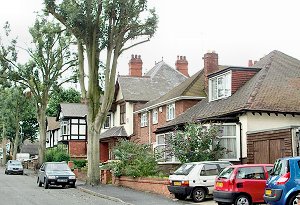 | The Hughes family bungalow is the one on the right - in an quite ordinary suburban street. |
It seems all his books were written for young people. Nearly all of them have Chris Godfrey as hero. He works for United Nations Exploration Agency, UNEX and leads a team of mixed nationalities, including a Russian. After some years Walter was surprised to find that more and more girls were reading his stories and writing to him, and some of them complained that there were no girls in his books. So Chris Godfrey was joined by Sue Howard.Of his writing Walters said: "I believe a good SF story should (1) entertain, (2) educate painlessly, and (3) inspire the young people of today to be the scientists and technicians of tomorrow".
As to entertainment, the earlier books are straightforward space adventures. Many of the later books contain elements of mystery and detection stories. As to education, he was always anxious that "SF stories should be credible and scientifically and technically accurate , young people are a very critical readership." In pursuit of accuracy he travelled a good deal, including a number of visits to the USA where he went to Houston, Cape Canaveral for the launch of Apollo 15, clambered around inside space ships and examined samples of moon dust. He was also a member of the British Interplanetary Society whose interests were always in scientific accuracy and who would have helped to keep him informed of the latest thinking.
| As to his hope that "Some of the young people who read them may be persuaded to take up a scientific or technical career and join the ranks of those highly trained men whom the Western world so badly needs to-day" one cannot judge whether it was fulfilled or not. But it seems reasonable to suppose that, as his books were read by so many youngsters, some at least must have been encouraged on their way to being scientists and engineers. And the effect would have been widespread as his books were translated into numerous European languages and published in the USA. They were also rendered into Braille. |
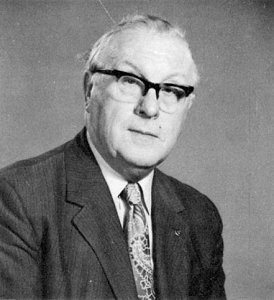 |
Walter's first wife, Doris, died in 1965. In 1978 he married Susan Hughes (whose identical surname was merely coincidental). At some period in his life Walter seems to have become a non-believer, maybe agnostic, maybe atheist. But the study of space restored his faith. He said: "It is impossible to comprehend infinity and the fantastic wonders of space. I realised there must be a supreme intelligence that arranged it all". He became a regular church goer and, in due course, a churchwarden of St. Leonard's. Walter Hughes died, of heart problems, at Athol House nursing Home, Richmond Road, Wolverhampton, on the 13th January 1993. His funeral service was held at St. Leonard's.